Is American intervention in Venezuela justified?
How to succeed in democracy without really trying
In 2017, millions protested against President Nicolas Maduro dissolving the opposition-led National Assembly congress to create a puppet congress, the Constituent Assembly. The opposition to his increasingly authoritarian actions signaled support in Hugo Chavez’s 1999 Bolivarian socialist revolution was finally waning
February 7, 2019
NEWS COLUMN:
Imperialism is how Americans learn geography.
As President Donald Trump prepares a national emergency declaration to appropriate border wall funds, the real migration crisis in the Americas is unfolding in Venezuela.
Over 3 million people have fled the oil-rich nation, once boasting the strongest economy in Latin America. Since oil revenues plummeted in 2014, the authoritarian regime of President Nicolas Maduro has invited 1.3 million percent inflation, power cuts and shortages in food and medicine upon a desperate public.
“To be neutral, is to be on the side of the regime that has condemned hundreds of thousands of human beings in misery, hunger and exile – including death,” said opposition leader Juan Guaido, urging world leaders to support his challenge to Maduro’s authority.
Guaido said a fraudulent election marred by opposition boycott and politically-motivated imprisonment makes him, as leader of the National Assembly, the constitutional leader.

David Goldberg, professor of political science at the College of DuPage, warns of the American impulse to sabre-rattle in the name of democracy, while forgetting the lessons of our interventionist past.
“Even Latin Americans who hate Maduro are scared of U.S. interventionism,” said Goldberg. “Nothing unifies people stronger than the threat of U.S. military action. People never forget the past interventions and covert operations, and it’s easy to blame anything, whether warranted or not, on U.S. imperialism.”
Goldberg believes the Trump Administration should rely on diplomacy and cooperation with international organizations to inspire a peaceful resolution to the crisis.
The further threat of military action or forceful tactics only serves to unite people behind the dictators America endeavors to remove.
The question remains, how does America usher in democratic change without rehashing the old imperialistic haunts? What’s the point in speaking softly and carrying a big stick, if you never get to swing it around?
Following the spirit of ex-Venezuelan President Hugo Chavez’s 1999 Bolivarian socialist revolution, Maduro has painted Americans as diabolical imperialists intent on staging a coup to profit off Venezuela’s oil.
“If the aim of the United States is to invade, they’ll have a Vietnam worse than can be imagined,” said Maduro to cheering supporters.
Enraging Maduro, the United States, European Union and most Latin American nations have officially recognized Guaido as rightful president. Authoritarian regimes like China, Russia, Cuba and Turkey continue to support Maduro.
Anti-Maduro demonstrations have been responded to with brutality from security forces. Forty protestors have been killed since Jan. 21, and almost 1,000 opposition supporters have been imprisoned, with many subject to torture. According to the Venezuelan Observatory of Violence, 43 extrajudicial killings and systematic torture by security forces have shaken Venezuela’s poorest slums.

The pro-government supreme court has barred Guaido from leaving Venezuela and froze his financial assets. U.S. National Security Advisor John Bolton warned Maduro will face, “serious consequences” if Guaido is harmed.
Fervent pro-government rallies demonstrate the fractured conscious of the nation, heightening tensions of violence.
To aid Guaido’s efforts to establish a transitional government, the U.S. State Department gave him access to all Venezuelan bank accounts held in the U.S. They also assured $20 million from the international community in food and medical aid would be provided for the opposition to disseminate.
The U.S. has also sanctioned Maduro’s regime, depriving them of $11 billion in oil export revenues over the next year. The sanctions restrict foreign entities from conducting business with Maduro using the U.S. financial system. The Trump Administration also blocked Venezuela out of credit markets, handicapping the ability to restructure their massive debts.
Oil provides more than 90 percent of Venezuela’s foreign revenue. Preceding the nation’s economic crisis was Chavez and Maduro’s failure to diversify their economy. Short-sighted policies were coupled with corruption, cronyism, mismanagement and reckless social spending.
Goldberg believes the economic insecurity bares multi-faceted responsibility.
“One can be critical of Chavez and Maduro’s policies for what they’ve done to the Venezuelan people and economy, while also recognizing U.S. interventionism has stunted economic and political development in Latin America for over 150 years,” said Goldberg.
Goldberg explained Chavez repeatedly humiliated U.S. presidents face-to-face by referring to 500 years of American imperialism in Latin America.
Chavez referenced America’s complicity in the 1973 Chilean coup against democratically-elected socialist President Salvador Allende, replaced by military dictator Augusto Pinochet. Pinochet’s brutal regime would go on to murder thousands and torture tens of thousands of Chileans.
During the cold war, the CIA sponsored the systematic assassination and repression of socialist leaders, further empowering Latin American dictators under the clandestine Operation Condor. According to the New York Times, an estimated 60,000 political opponents were killed in far-right, American-supported efforts to eradicate communism.
President Ronald Reagan resurrected the mantra of the Monroe Doctrine, saying the Roosevelt Corollary justified American intervention at the behest of providing regional security. The Reagan Doctrine was used to justify anti-communist actions like the invasion of Grenada and the support of the right-wing terrorist Contras. The Contras’ guerilla efforts to topple the Sandinista government of Nicaragua resulted with tens of thousands being killed.
Goldberg said, in 2011 Chavez was temporarily forced from power under American-inspired actions. He believes intervention just fuels the malicious public narrative of the CIA.

“Brutal dictators should be challenged on their humanitarian abuses, but it’s a profound mistake to continue the missteps of twentieth-century U.S. foreign policy in Latin America,” said Goldberg.
Goldberg believes the Organization of American States (OAS) has credibility in the hemisphere and will be crucial to inspiring democratic reform. Actions through the OAS are perceived less as violations of sovereignty than when the U.S. chooses to act unilaterally.
However, Goldberg warns believing they can easily bring democracy to any nation is a foolish mentality for the OAS and the US to posit.
“Chavez and Maduro have taken 20 years to tear apart the democratic institutions of the constitution, electoral system, the free press, labor unions and business confederations,” said Goldberg. “It’s going to take a long time to redevelop all that’s been lost; there’s no quick solution.”
Imperative to dismantling the regime is corroding support for Maduro among the military. Chavez purged the military and rewarded loyalty with lucrative cabinet posts and positions in the oil industry. Maduro has continued Chavez’s practices and doles out pay raises for loyalty.
Guaido has offered amnesty to any members who switch allegiance to the opposition. Such defections are met with accusations of treason.
Amnesty would be offered for the rampant lesser crimes of embezzlement, drug trafficking and money laundering. However, Goldberg said those guilty of killing civilians in a systematic way would not be offered amnesty. These military members see little benefit in giving up their guns and support for Maduro.
“Traditionally in Latin America, when civilians cannot maintain the democratic institutions, the military intervenes to save the security of the nation,” said Goldberg. “However, as long as the military continues to support Maduro, any change will involve bloodshed.”
Before Chavez, Venezuela experienced high corruption and economic inequality, but was prosperous under a two-party political system. Unlike regional nations who succumbed to military dictatorships, Venezuela remained stable throughout the twentieth century.
Goldberg believes Chavez could have accomplished his socialist goals of helping the poor without reverting to authoritarianism.

“Chavez, and leaders like Daniel Ortega in Nicaragua, are more like traditional Latin American strongmen Caduillos than ideological socialists,” said Goldberg. “Fundamentally, they carry the veneer of socialism while representing the resurgence of authoritarianism. By using the socialist ideology as a weapon, they embolden their self-rule by deconstructing the institutions of democracy.
Trump has capitalized on the chaos in Venezuela to paint all socialist nations or politicians who support democratic socialism with a broad brush.
However, socialism ideologically means the country’s wealth is disseminated more equally amongst its people. The citizens control the means of production and the distribution of goods. Socialism can be used under any form of government from communism, democracy, authoritarianism, to the result of outcomes as diverse as the USSR and modern democratic socialist governments in Scandinavia.
Goldberg believes simplifying policies down to politically-motivated labels dangers delegitimizing the seriousness and complexity of political issues.
He believes instead of continuing to paint foreign policy with ideological brushes, we should focus on the humanitarian severity of the situation.
With inflation causing Venezuelan food prices to double every 19 days, Trump’s efforts should be concentrated on humanitarian relief. Lack of medicine has contributed to over 600,000 cases of malaria in 2017, a 50 percent increase from the previous year. The impoverished and hungry Venezuelans fleeing their country have been met with anti-immigrant resistance from neighboring countries.
The strain on each nation’s social services has resulted in a nationalistic anger unseen on the continent for many decades.
Nationalism fuels anti-American sentiment and provides ripe situations for further un-democratic regimes to consolidate power.
Goldberg believes the OAS and the UN should work to provide a peaceful exit strategy for Maduro, amnesty for military members, and lay the groundwork for future free and fair elections.
“All over the world, forces of nationalism and economic populism are symptoms of dissatisfaction with the political and economic institutions no longer serving all of society,” said Goldberg. “The solutions the world has been coming up with have been more dysfunctional than the problems they have been trying to replace. Unless all voices are heard, democracy will never have the chance to flourish.”



















Linda Gulotta • Feb 17, 2019 at 12:29 pm
I read all your articles and find you to
Be a fantastic reporter!
Linda Gulotta